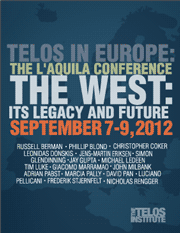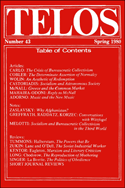By Marcia Pally · Wednesday, December 5, 2012 This paper was presented at Telos in Europe: The L’Aquila Conference, held on September 7-9, 2012, in L’Aquila, Italy.
 Whatever the ostensible theme of the September 2012 Telos conference, it seems the real one was the mess in the West. Has the West lost its pizzazz, gravitas, ability to guide? Have we become too secular, merely rational, and thus paradoxically ungrounded? Or are we not rational enough, our politics and economics still beset by emotional, quasi-religious beliefs? Whatever the ostensible theme of the September 2012 Telos conference, it seems the real one was the mess in the West. Has the West lost its pizzazz, gravitas, ability to guide? Have we become too secular, merely rational, and thus paradoxically ungrounded? Or are we not rational enough, our politics and economics still beset by emotional, quasi-religious beliefs?
From my perch, the West hasn’t lost anything but rather has gotten too much of what might be a good thing were there less of it. That thing is separability, and too much of it, untempered by situatedness, yields abandonment and anomie on one hand and selfishness on the other. Of course, too much situatedness would be equally damaging—oppressive and stultifying. It is the binary choice—separabilty or situatedness—that leads the West to the worst of itself. Thus what is needed are frameworks that foster the simultaneous presence of both. Here I’ll point to one, theologies of relationality.
Continue reading →
By Tomash Dabrowski · Tuesday, October 2, 2012 As an occasional feature on TELOSscope, we highlight a past Telos article whose critical insights continue to illuminate our thinking and challenge our assumptions. Today, Tomash Dabrowski looks at Richard Wolin’s “An Aesthetic of Redemption: Benjamin’s Path to Trauerspiel“ from Telos 43 (Spring 1980).
 Despite renewed interest in Walter Benjamin, his work still remains enigmatic seventy years after his death, and the obscurity of his thought is compounded by the efforts of friends and associates wishing to reclaim his work to their respective traditions. Those who knew him during his lifetime—and especially those instrumental to the belated dissemination of his work—sometimes repudiate his theological motifs, others his particular variant of Marxism (or questioning whether he could be called a Marxist at all). But there seems to be a consensus as to their incongruity. Adorno for instance once chastised Benjamin’s work as “undialectical,” and Gershom Scholem found his theology to be plagued by ill-conceived communist alliances (which is to say nothing about his dispute with Hannah Arendt about which school of thought Benjamin’s contribution legitimately lies). Leszek Kołakowski’s reading, in his eminent Main Currents of Marxism, is emblematic of the mischief caused by measuring Benjamin’s work against the weight of tradition. Kołakowski finds that Benjamin “seems to have tried to graft historical materialism on his own theory of culture, which had nothing to do with Marxism and which he had worked out beforehand.” Despite renewed interest in Walter Benjamin, his work still remains enigmatic seventy years after his death, and the obscurity of his thought is compounded by the efforts of friends and associates wishing to reclaim his work to their respective traditions. Those who knew him during his lifetime—and especially those instrumental to the belated dissemination of his work—sometimes repudiate his theological motifs, others his particular variant of Marxism (or questioning whether he could be called a Marxist at all). But there seems to be a consensus as to their incongruity. Adorno for instance once chastised Benjamin’s work as “undialectical,” and Gershom Scholem found his theology to be plagued by ill-conceived communist alliances (which is to say nothing about his dispute with Hannah Arendt about which school of thought Benjamin’s contribution legitimately lies). Leszek Kołakowski’s reading, in his eminent Main Currents of Marxism, is emblematic of the mischief caused by measuring Benjamin’s work against the weight of tradition. Kołakowski finds that Benjamin “seems to have tried to graft historical materialism on his own theory of culture, which had nothing to do with Marxism and which he had worked out beforehand.”
Continue reading →
|
|
 Whatever the ostensible theme of the September 2012 Telos conference, it seems the real one was the mess in the West. Has the West lost its pizzazz, gravitas, ability to guide? Have we become too secular, merely rational, and thus paradoxically ungrounded? Or are we not rational enough, our politics and economics still beset by emotional, quasi-religious beliefs?
Whatever the ostensible theme of the September 2012 Telos conference, it seems the real one was the mess in the West. Has the West lost its pizzazz, gravitas, ability to guide? Have we become too secular, merely rational, and thus paradoxically ungrounded? Or are we not rational enough, our politics and economics still beset by emotional, quasi-religious beliefs?  Despite renewed interest in Walter Benjamin, his work still remains enigmatic seventy years after his death, and the obscurity of his thought is compounded by the efforts of friends and associates wishing to reclaim his work to their respective traditions. Those who knew him during his lifetime—and especially those instrumental to the belated dissemination of his work—sometimes repudiate his theological motifs, others his particular variant of Marxism (or questioning whether he could be called a Marxist at all). But there seems to be a consensus as to their incongruity. Adorno for instance once chastised Benjamin’s work as “undialectical,” and Gershom Scholem found his theology to be plagued by ill-conceived communist alliances (which is to say nothing about his dispute with Hannah Arendt about which school of thought Benjamin’s contribution legitimately lies). Leszek Kołakowski’s reading, in his eminent Main Currents of Marxism, is emblematic of the mischief caused by measuring Benjamin’s work against the weight of tradition. Kołakowski finds that Benjamin “seems to have tried to graft historical materialism on his own theory of culture, which had nothing to do with Marxism and which he had worked out beforehand.”
Despite renewed interest in Walter Benjamin, his work still remains enigmatic seventy years after his death, and the obscurity of his thought is compounded by the efforts of friends and associates wishing to reclaim his work to their respective traditions. Those who knew him during his lifetime—and especially those instrumental to the belated dissemination of his work—sometimes repudiate his theological motifs, others his particular variant of Marxism (or questioning whether he could be called a Marxist at all). But there seems to be a consensus as to their incongruity. Adorno for instance once chastised Benjamin’s work as “undialectical,” and Gershom Scholem found his theology to be plagued by ill-conceived communist alliances (which is to say nothing about his dispute with Hannah Arendt about which school of thought Benjamin’s contribution legitimately lies). Leszek Kołakowski’s reading, in his eminent Main Currents of Marxism, is emblematic of the mischief caused by measuring Benjamin’s work against the weight of tradition. Kołakowski finds that Benjamin “seems to have tried to graft historical materialism on his own theory of culture, which had nothing to do with Marxism and which he had worked out beforehand.” 

